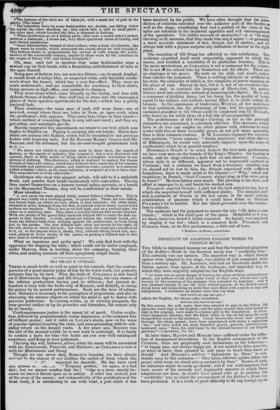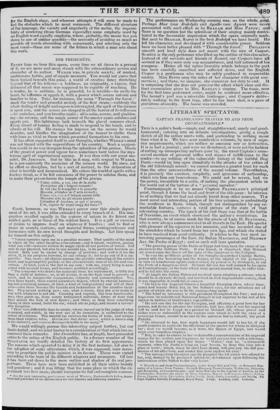DIFFICULTY OF ADAPTING ENGLISH WORDS TO FOREIGN MUSIC.
THE Globe is distressed because we said that the translated adaptation of the Robber's Bride to the German music was " creditably done." This certainly was our opinion. The imperfect way in which foreign operas were adapted to our stage, was matter of just complaint more than a century ago. Mr. ADDISON, who had an inveterate dislike for Italian operas, thus speaks of the barbarous and imperfect way in which they were originally adapted for the English stage.
"As there was no great danger of hurting the sense of these extraordinary pieces, our authors would often make words of their own, which were quite foreign to the meaning of the passages they intended to translate. And it was pleasant enough to see the most refined persons of the British nation dying away and languishing to notes that were filled with a spirit of rage and indignation. I remember an Italian verse that ran thus
'And turn'd my rage into pity
which the English, for rhyme sake, translated,
And into pity turn'd my rage.'
By this means, the soft notes that were adapted to pity in the Italian, fell upon the word rage in the English ; and the angry sounds that were turned to rage in the original, were made to express pity in the translation. It often- times happened, likewise, that the finest notes in the air fell upon the most insignificant words in the sentence. I have known the word and' pursued through the whole gamut ; have been entertained with many a melodious ' the ; ' and have heard the most beautiful graces, quavers, and divisions, bestowed upon then, for, and from,' to the eternal honour of our English partieles."—(Spectator, No. 18.)
In later times, HAYDN and MOZART have suffered under the inflic- tion of incompetent translators. In the English arrangement of the Creation, there are perpetually such barbarisms as the following,— " 0 happy pair, and always happy yet, if not misled by false conceits, ye strive at more than granted is, and more to know than know ye should." And MozAar's sublime " Splendente te, Deus" is con- stantly sung to this nonsense—" Dire hosts, infernal sprites infest our peace, while weak we stand unless sustain'd by thee." Scores of simi- lar instances might be easily produced; and if our contemporary had been aware of the slovenly and disgraceful manner in which these adaptations are done, he would have joined with us in praising the "creditable" way in which the arrangement of the Robber's Bride has been produced. It is a work of great difficulty to fit any foreign opera
for the English stage, and whoever attempts it will soon be made to feel the obstacles which he must surmount. The different structure of the language, the variety and singularity of the metre, the iinpossi- bility of rendering (from German especially) some emphatic word by an English word equally emphatic, where, probably, the music ties you down to one of similar quantity—the necessity of avoiding as much as possible all words abounding with consonants, and selecting only the most vocal—these are some of the fetters in which a man sets about this work.



















 Previous page
Previous page